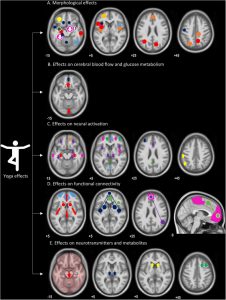Activate the Brain and Synchronize the Cerebral Hemispheres with Kriya Yoga
By John M. de Castro, Ph.D.
“Kriya yoga in Sanskrit means “to move.” The yoga combines all the energy in the body of the mind and to increase the concentration and the awareness in the body. It helps in energizing all the parts of your body. The internal organs inside your body thyroid, spleen, liver, and pancreas, are energized which improve your overall health.” – Larissa Smith
Mindfulness training has been shown to improve health and well-being. It has also been found to be effective for a large array of medical and psychiatric conditions, either stand-alone or in combination with more traditional therapies. There are a wide variety of different mindfulness training techniques. Sudarshan Kriya Yoga (SKY) is an ancient technique that involves cyclical breathing patterns that range from slow and calming to rapid and stimulating. How exactly SKY produces its benefits is unknown.
One way to observe the effects of mindfulness practices is to measure changes in the electroencephalogram (EEG), the rhythmic electrical activity that can be recorded from the scalp. The recorded activity can be separated into frequency bands. Delta activity consists of oscillations in the 0.5-3 cycles per second band. Theta activity in the EEG consists of oscillations in the 4-8 cycles per second band. Alpha activity consists of oscillations in the 8-12 cycles per second band. Beta activity consists of oscillations in the 13-30 cycles per second band while Gamma activity occurs in the 30-100 cycles per second band.
In today’s Research News article “High-Frequency Cerebral Activation and Interhemispheric Synchronization Following Sudarshan Kriya Yoga as Global Brain Rhythms: The State Effects.” (See summary below or view the full text of the study at: https://www.ncbi.nlm.nih.gov/pmc/articles/PMC7336945/) Bhaskar and colleagues recruited adult Sudarshan Kriya Yoga practitioners. They recorded the electroencephalogram (EEG) for 5 minutes before and after a 1-hour Sudarshan Kriya Yoga practice.
They found that after Sudarshan Kriya Yoga (SKY) practice there was a significant increase in the spectral power of all EEG frequency bands. They also found that after SKY there was a significant increase in the synchronization of the electrical activity in the rwo cerebral hemispheres. These results indicate that a single session of SKY increases overall brain activity and interhemispheric synchronization.
These findings suggest that Sudarshan Kriya Yoga (SKY) practice heightens neural activity in a synchronized fashion. This suggests that SKY practice improves physiological balance, alertness, and mental well-being. It remains for future research to determine whether these changes in brain activity occur in SKY naive participants and whether these changes are lasting or only occurring in the immediate aftermath of SKY practice.
So, activate the brain and synchronize the cerebral hemispheres with Kriya Yoga.
“Kriya Yoga is universal in its benefits: it doesn’t depend on anything outside itself.” — Paramhansa Yogananda
CMCS – Center for Mindfulness and Contemplative Studies
This and other Contemplative Studies posts are also available on Google+ https://plus.google.com/106784388191201299496/posts and on Twitter @MindfulResearch
Study Summary
Bhaskar, L., Tripathi, V., Kharya, C., Kotabagi, V., Bhatia, M., & Kochupillai, V. (2020). High-Frequency Cerebral Activation and Interhemispheric Synchronization Following Sudarshan Kriya Yoga as Global Brain Rhythms: The State Effects. International journal of yoga, 13(2), 130–136. https://doi.org/10.4103/ijoy.IJOY_25_19
Abstract
Context:
Respiration is known to modulate neuronal oscillations in the brain and is measured by electroencephalogram (EEG). Sudarshan Kriya Yoga (SKY) is a popular breathing process and is established for its significant effects on the various aspects of physiology and psychology.
Aims:
This study aimed to observe neuronal oscillations in multifrequency bands and interhemispheric synchronization following SKY.
Settings and Design:
This study employed before- and after-study design.
Subjects and Methods:
Forty healthy volunteers (average age 25.45 ± 5.75, 23 males and 17 females) participated in the study. Nineteen-channel EEG was recorded and analyzed for 5 min each: before and after SKY. Spectral power for delta, theta, alpha, beta, and gamma frequency band was calculated using Multi-taper Fast Fourier Transform (Chronux toolbox). The Asymmetry Index was calculated by subtracting the natural log of powers of left (L) hemisphere from the right® to show interhemispheric synchronization.
Statistical Analysis:
Paired t-test was used for statistical analysis.
Results:
Spectral power increased significantly in all frequency bands bilaterally in frontal, central, parietal, temporal, and occipital regions of the brain after long SKY. Electrical activity shifted from lower to higher frequency range with a significant rise in the gamma and beta powers following SKY. Asymmetry Index values tended toward 0 following SKY.
Conclusions:
A single session of SKY generates global brain rhythm dominantly with high-frequency cerebral activation and initiates appropriate interhemispheric synchronization in brain rhythms as state effects. This suggests that SKY leads to better attention, memory, and emotional and autonomic control along with enhanced cognitive functions, which finally improves physical and mental well-being.
https://www.ncbi.nlm.nih.gov/pmc/articles/PMC7336945/









